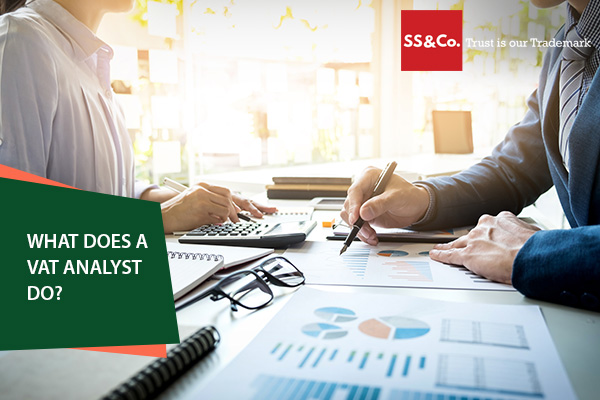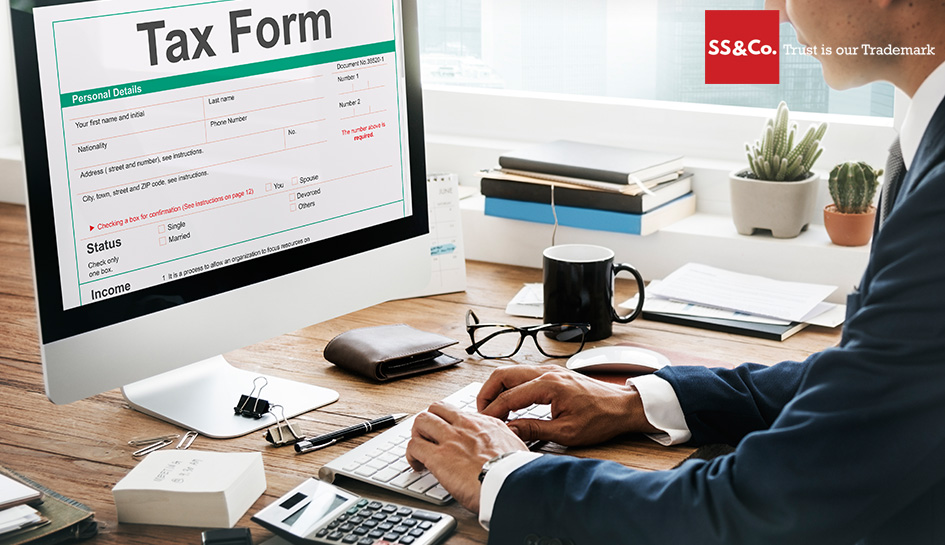What does a VAT analyst do?

In any progressing country the foundation of a strong economy is built on taxation, it facilitates the government in gathering funds for social programs, healthcare, infrastructure and education. If we talk about taxes, VAT is one of the most critical of all and the most widely used indirect tax around the globe. However, compliance with VAT is not merely about filing returns, but it demands complete precision, which might seem simple, but every country comes with its own set of VAT legislations, deadlines, and reporting requirements which create a complex web of obligations. These obligations can be burdensome for the internal teams already piled up with endless work. That’s where a VAT analyst plays their role, from managing risks, filing VAT returns, and dealing with authorities to assuring that business is always legally compliant with the latest VAT regulations; they cover it all.
They know that VAT compliance is not about paperwork or managing transaction but it’s a complete methodology to build a smart and structured VAT approach to keep your business always aligned, transparent and free from legal stumbling blocks through your journey to success.
Understanding VAT and the Role of VAT Analyst
VAT is mainly a consumption-based indirect tax that is charged on the value that is added to goods and services throughout all stages of distribution and production. It is utilized by more than 170 countries, including Saudi Arabia, where VAT was introduced in 2018 to lessen the dependency on oil reservoirs. Initially the VAT rate in KSA was 5% which was later increased to 15% due to the aftermaths of Covid 19. Since then, the VAT rules have also toughened and become stricter. VAT today directly impacts the cash flow, pricing structures, profit ratios, and compliance matters of any business, be it an SME or a large enterprise.
A VAT analyst is a specialized and experienced professional who eases the process of applying complex VAT laws professionally. They manage and supervise each VAT compliance matter that looks after all the business areas that impact compliance directly like financial transactions, cashflows, bank reconciliations and preparing the right budgets. They also detect any forthcoming risk, analyze financial data and advise the stakeholders regarding any possible changes and implications. This in turn keeps a business always guarded from any compliance mistake. Why might your business need a VAT analyst? Because they help in:
- Protecting from any legal penalty which not just cause financial damage but also reputational damage
- Proficient planning of VAT to get the maximum tax recovery and to enhance the cash flow
- Handling the VAT rules according to the specific country and industry to keep you safe from any legal trouble
- Keeping you always ready for the future like adapting the latest tools that help in digital tax filing.
They are generally hired by SMEs finding it critical to oversee VAT management, large corporations handling business across borders, audit and accounting firms offering VAT advisory services, tax consultancy firms, and Government and regulatory bodies who need to monitor VAT compliance.
Key Responsibilities of a VAT Analyst
The duties of a VAT analyst can change depending on the organization and jurisdiction they are dealing with. Every country offers its own set of VAT rules, which also change for each industry, like for some areas VAT can be higher than the fixed rate, with stronger regulations. The core responsibilities they provide include,

1. VAT Compliance and Reporting
They get everything set for VAT compliance by computing and filing VAT returns on time, they also reconcile VAT accounts with financial records of a company and make sure that all the regional obligations and international legislations (in case of multinational businesses) are fully adhered.
2. Data Analysis and Transaction Review
They keep track of sales and purchase data and invoices for the right VAT treatment. They detect any input VAT tax credits and take all necessary measures to claim them properly. In case of any gaps or inconsistencies in financial data, they know how to fix them to futureproof a business.
3. Risk Management
They keep an eye on every area that is possibly exposed to VAT, to keep a company guarded from any threats and penalties. They adopt optimal strategies that minimize any compliance or financial risks.
4. Advisory and Internal Support
They counsel business authorities and make recommendations on VAT effects and consequences of any new contracts, transactions, and latest projects. They assist businesses in developing a tax-efficient supply chain and offer them support in internal audits.
5. Communication with Authorities
In case of any legal questioning, they represent the business on their behalf and prepare all the essential documents and proof in case of any external audits. They settle any disputes during the inspections with VAT authorities.
Why Businesses in KSA need a VAT Analyst
The KSA regulatory landscape has become much stronger and more uncompromising, and the demands for compliance have increased as the country is moving towards advancement and innovation. This is why businesses today prefer to hire a VAT analyst who offers the best VAT services in Saudi Arabia. Here, we will shed light on some of the key reasons to hire a VAT analyst in KSA.
1. Compliance with ZATCA Regulations
The Zakat Tax and Custom Authority (ZATCA) look after the accurate compliance management of VAT laws in KSA, a VAT analyst make certain that:
- Businesses use the right process to register for VAT with ZATCA
- File the right amount of VAT returns as per rules, be it monthly or quarterly, according to their turnover
- Compute the accurate VAT amount using the right taxable, exempt, and zero-supplies as fixed by ZATCA
- Must keep the record safe for at least six years, as said by the legal laws.
2. Managing VAT on Cross-Border Transactions
KSA is a major hub of trade and investment around the GCC and has strict rules for the import and export businesses. A VAT analyst helps in
- Reviewing the declarations by customs and making sure that the right amount of VAT is calculated
- Ensuring that a proper reverse change mechanism is accounted on all imports
- Grasping the intra-GCC trade as the VAT rules change in different jurisdictions.
3. Adapting to E-Invoicing (FATOORA)
The mandatory E-invoicing of KSA comes with its own set of rules, and VAT analysts facilitate in:
- Executing e-invoicing systems that stay compliant with ZATCA phase 1 and phase 2 demands
- Securing the right QR codes, invoice formats and XML/UBL standards as defined in e-invoicing laws
- Staying in touch with the IT and finance teams to deploy the e-invoicing with ERP systems
4. Risk Management and Audit Preparation
VAT audits conducted by tax authorities are highly data driven, a VAT analyst simplify the process through,
- Conducting reconciliation of accounting records and VAT returns
- Detecting and fixing any discrepancies before ZATCA Audits
- Storing and retaining the right documentation to protect VAT positions
5. Advisory Role in Business Decisions
VAT legislation in KSA highly impacts the business’s day-to-day operations. A VAT analyst offers advice to,
- Supply chain managements teams on signing contracts with vendors, specifically where the VAT is included or omitted
- Sales team and department on smart pricing strategies to reduce tax liabilities
- Business management teams need to plan cash flow proficiently to make sure that all VAT liabilities are met on time.
Key Qualities to Look for in a VAT Analyst
Appointing the best VAT analyst for VAT services in Saudi Arabia can be challenging, as it demands in-depth research to keep a handle on your critical VAT operation to the right VAT professional. Businesses must emphasize the following attributes.
- They must have strong technical expertise and an understanding of local and global VAT laws and exemptions.
- Your VAT analyst should know the need of your industry’s VAT legal guidelines
- Should be able to take care of large data sets, reconcile VAT returns, and catch errors proactively
- Must be able to operate ERP systems, automation tools and e-invoicing compliance
- They must build a clear communication with internal teams and VAT authorities to further streamline VAT procedures
- They must be flexible enough to change and adapt to the changing regulations and adjust the processes accordingly.
Connect with SS&CO’s VAT Experts!
In the present times, VAT is more than just a compliance matter; it shapes a business’s complete financial outlook. However, the scaling compliance across distinct transactions, filing, and regulations can feel over demanding. That’s where SSCOKSA’s VAT analysts step in. Being one of the best tax advisory firms in KSA, we offer professional experts who are not just familiar with local VAT obligations but also with international VAT practices. With our top-notch digital systems and industrial best practices, you get the best and most compliant VAT outcomes. Why do you need us? Since we:
- Comprehensively guide you in the VAT registration process through the e-portals of ZATCA
- Manage monthly and quarterly VAT returns with precision and excellence
- Deal with the intricacies of phase 2 Fatoora integration, including QR code, XML reporting, and cryptographic stamping requirements
- Pinpoint weakness in compliance to guard companies from fines and legal hurdles
- Conduct VAT health checkups to unveil hidden risks and structure VAT operations
- Leverage smart and advanced tools to automate routine operations and minimize manual labor errors
- Offer continuous support and monitoring to keep you in line with any recent changes in VAT reforms and rules.
Our services are not bound to any specific scale or industry, but we serve everyone regardless of size and requirements to keep you always fully compliant, free from stress, and ready to progress towards a promising future.

